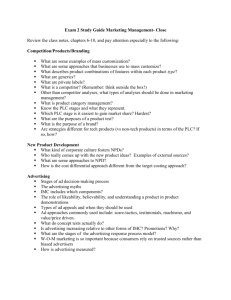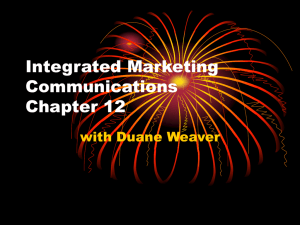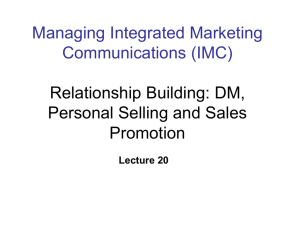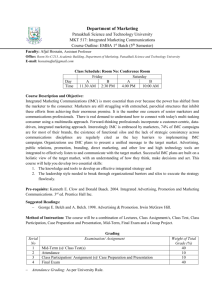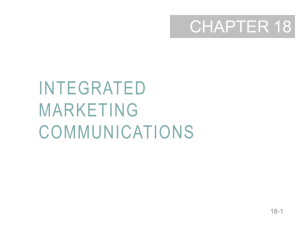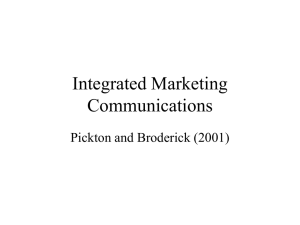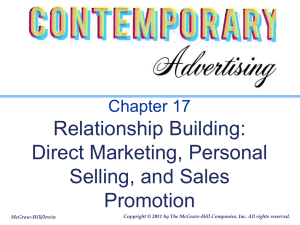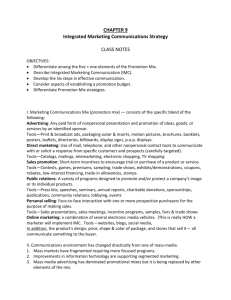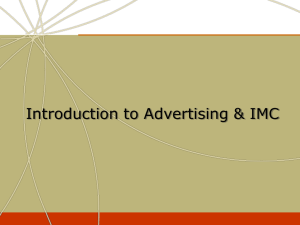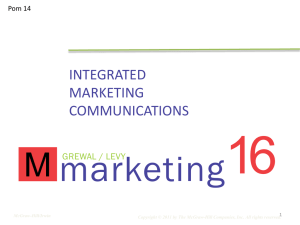Harrah's Entertainment, Inc.
advertisement
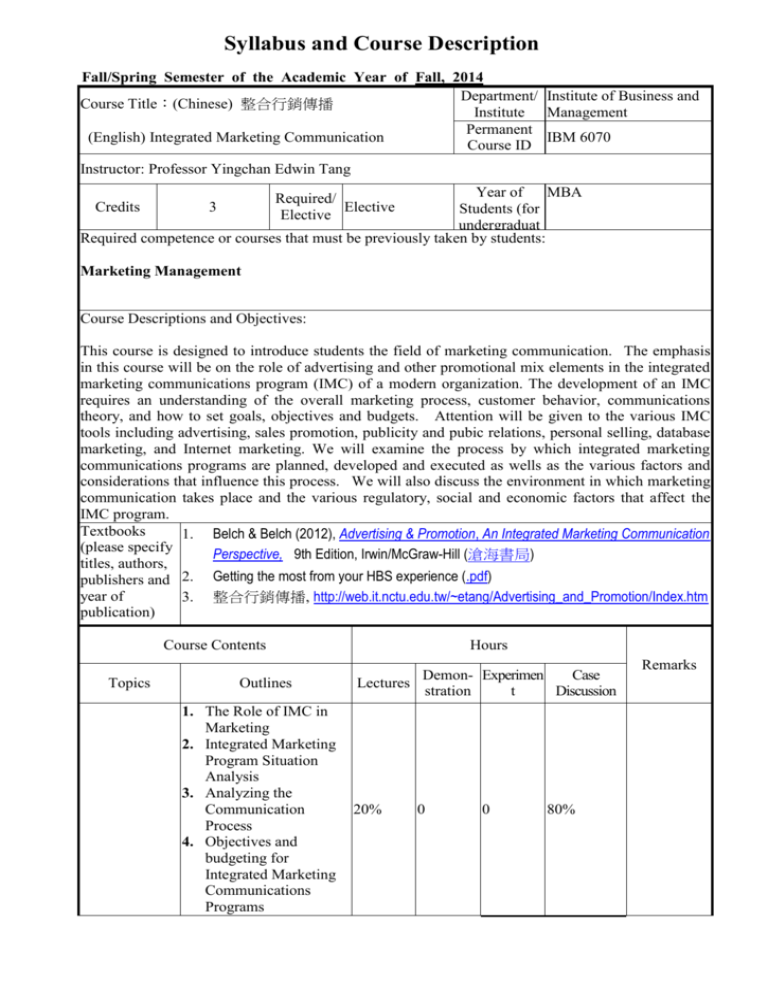
Syllabus and Course Description Fall/Spring Semester of the Academic Year of Fall, 2014 Department/ Institute of Business and Course Title:(Chinese) 整合行銷傳播 Institute Management Permanent (English) Integrated Marketing Communication IBM 6070 Course ID Instructor: Professor Yingchan Edwin Tang Year of MBA Students (for undergraduat Required competence or courses that must be previously taken eby students: courses) Credits Required/ Elective Elective 3 Marketing Management Course Descriptions and Objectives: This course is designed to introduce students the field of marketing communication. The emphasis in this course will be on the role of advertising and other promotional mix elements in the integrated marketing communications program (IMC) of a modern organization. The development of an IMC requires an understanding of the overall marketing process, customer behavior, communications theory, and how to set goals, objectives and budgets. Attention will be given to the various IMC tools including advertising, sales promotion, publicity and pubic relations, personal selling, database marketing, and Internet marketing. We will examine the process by which integrated marketing communications programs are planned, developed and executed as wells as the various factors and considerations that influence this process. We will also discuss the environment in which marketing communication takes place and the various regulatory, social and economic factors that affect the IMC program. Textbooks 1. Belch & Belch (2012), Advertising & Promotion, An Integrated Marketing Communication (please specify Perspective, 9th Edition, Irwin/McGraw-Hill (滄海書局) titles, authors, publishers and 2. Getting the most from your HBS experience (.pdf) year of 3. 整合行銷傳播, http://web.it.nctu.edu.tw/~etang/Advertising_and_Promotion/Index.htm publication) Course Contents Topics Outlines 1. The Role of IMC in Marketing 2. Integrated Marketing Program Situation Analysis 3. Analyzing the Communication Process 4. Objectives and budgeting for Integrated Marketing Communications Programs Hours Demon- Experimen Case Lectures stration t Discussion 20% 0 0 80% Remarks 5. Developing the Integrated Marketing Communications Program 6. Monitoring, Evaluation, and Control 7. Special Topics and Perspectives Description of Course Details: 20% 0 0 80% Internet Resources: 1. Advertising World -- a great collection of IMC-related links from UTexas 2. ciAD @ UT-Austin -- State-of-the Art media planning software 3. Advertising Age - The 20th century and marketing communications. 4. 5. 6. 7. Advertisement Ave -- the best web site to view current TV ads in USA ADSlogans Unlimited - Ad Slogan "Hall of Fame" by year and brand. AdCracker -- a good collection of "street smart" creative strategies Duke Endowment "Library 2000" Fund -- a good collection of over 7,000 printed advertisements in U.S. between 1911 and 1955. 8. US Library of Congress - all you want to know about Coca-Cola Ads 9. Smithsonian - Advertising and Commercial Imagery Collections 10. National Statistics of Taiwan -- All (nearly) you want to know about Taiwan PREREQUISITES Students should have taken Marketing Management or have marketing-related working experience. STUDENT RESPONSIBILITY Reading assignments should be prepared thoroughly prior to the session for which they are assigned. Lectures will parallel with the text and Online Learning Center in most instances but will be supplemented by additional material, thereby making attendance a necessity. Each student is expected to participate regularly in class discussion, both as called by the instructor and on a voluntary basis. To a large extent, learning this course is related to 1) the degree of your participation and sharing insights and knowledge, 2) willingness to expose your view points to the critical judgments of your classmates or team members, 3) ability to listen carefully to comments made by other participants Each student also has the responsibility to become familiar with the provision of the Honor Code and Honor System procedures by the National Chiao Tung University. TEAM TERM PROJECT The purpose of the term project is to give students participatory and applied learning experience in the field of advertising and promotion era. This semester we will be working with McAllen, Single Highland Malt Scotch Whisky. Each student team will be assigned as an ad agency and/or marketing consulting team. This means the student team will: 1) research and produce the situation analysis for the brand/product, 2) pitch a campaign theme to the target market, 3) allocate marketing communication budget, and 4) present the integrated marketing communication campaign proposal to TiVo's general manager. ONLINE CASES There are three cases from Pearson's Companion Websites and eight cases from Harvard Business Online. Each team will be responsible for one online case presentation, which takes a maximum 40 minutes in reviewing the case. For non-presenting teams, each team is expected to submit a maximum 4 typed pages with a brief of synopsis and the major issues resolved. The use of the participant-centered learning (PCL) case method in our class requires each one of you work individually first -- to carefully read and to think about each case (typically about two hours of preparation time for each case). Once you have done your individual preparation, then you're ready to joint your team's group discussion. The purpose of your group discussion is not to generate consensus, but rather it helps your team members to refine, adjust, and amplify their thinking. A fruitful group discussion is characterized by intense interaction that deepens participant's understanding beyond that gained through individual analysis. You then share your observations, analyses, ideas, or rule of thumb from your group analysis to the class for further discussion. You will quickly find out your teammates or your classmates differ significantly on what's important and how to deal with problems, and the impact of decisions in one sector of an organization upon other sectors. This diversity of opinion from differing perspectives, i.e., surprise, fun, exciting, and sometimes controversial and debates, offers real opportunities for shared learning in case discussion. Evaluation and Grading Policy 1. 2. 3. 4. Online Cases (Group Presentation, 2 cases) Online Cases (Group Summary, 12 cases) Case Discussion & Class Participation (Individual) Term Project & Teamwork (evaluation) Time Slot 20% 30% 25% 25% Location Contact Information Office Hours Friday 14:00-17:00 D17, 4th Floor, Appointment by email Syllabus Week Topics (Text Chapters) Harvard Cases 1 Class Setup IMC Planning Process (1) PCMPCL Introduction 2 7Ms of IMC in Marketing (2) Harrington Collection 3 Ad Agency (3) Leo Burnett Virtual Teamt 4 Management Yellow Tail 5 Consumer Behavior (4) elBulli: The Taste of Innovation 6 Market (5) Cola Wars Continue: Coke and Pepsi in 2006 7 Market (6) Gucci Group 2000~2009 8 Money and IMC Campaign (7) Reliance Baking Soda: Optimizing Promotional Spending 9 Creative Strategy (8) Mountain Dew’s New Creative 10 Message (9) BMW Films 11 Mass Media (10, 11, 12) Benecol Spread 12 Interactive & Internet Marketing (13, 14, 15) Sales Microsoft adCenter 13 Public Relation, Publicity, Promotion (16, 17, 18) 14 Measurement (19) 15 International Advertising (20) Samsung’s Global Marketing 16 Milieu (Product) Red 17 Regulation & Ethics (21, 22) Mattel Recalls 18 Project presentation L'Oreal, Globalization of American Beauty Harrah's Entertainment, Inc. Remarks: 1、Inclusive of visiting institutes/organizations outside the NCTU or other academic events. 2、Please adhere to pertinent regulations/laws on intellectual property rights. Do not use pirated textbooks. 附件三

